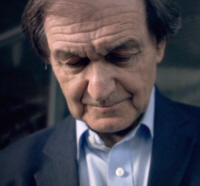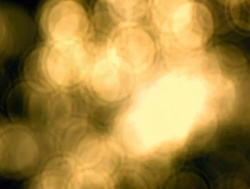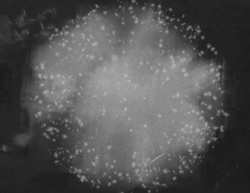Looking Back
Start at the End of the Universe
Horizon – Before the Big Bang

Professor Sir Roger Penrose
Maybe it would be best, like Michio Kaku, to stop thinking of nothing as nothing, but rather as just absence of stuff, and imagine bubbles of matter
forming in a high-energy vacuum. Is Param Singh correct? No big bang at all, just the big bounce, again, and again, and again.
Or should we subscribe to Andrei Linde’s Swiss cheese model, and redefine the big bang as simply the inflationary energy of a mega-verse dying out?
Ten to the power ten to the power ten to the power seven times.
All of these ideas stray from the standard model of cosmology, which holds that everything merged from nothing at the point of the big bang.
And they would be easier to dismiss as the half-baked musings of the lunatic fringe, were it not for the fact that some of the very people who constructed
the everything from nothing big bang model are themselves starting to dismantle it.
For many years, Professor Sir Roger Penrose spent much of his time dismissing the very idea of “before the big bang” as a complete non-starter.


Professor Sir Roger Penrose

Photons
Roger Penrose “If people would ask me what happened before the big bang, my normal answer would be to say,’ the words before. What does that
mean?’ Well, that’s the sort of temporal concept. And if the big bang was a singularity in space-time, that means the very notion of time
loses its meaning at this event, this so-called big bang. So if the notion of time loses its meaning, the very notion of before loses its
meaning. So we would tend to say it’s a meaningless question to ask for before, there wasn’t a before, that’s the wrong kind of notion. And
I would have perhaps gone along with this point of view, until I’ve had some different ideas more recently.”
Professor Penrose has concluded that to understand the origin of the big bang, science needs to study the end of the universe.
Professor Penrose “The present picture of the universe is that it starts with a big bang, and it ends with an indefinitely expanding,
exponentially expanding universe, where in the remote future it cools off, and there’s not much left except photons. Now what
I’m saying is that in this remote future, the photos have no way of keeping time and they don’t have any mass. You need mass to make a clock, and
you have to have a clock to measure the scale of the universe. So the universe loses track of how big it is. And this very expanded universe
becomes equivalent to the big bang of another one. So I’m saying that this, what we think of our present universe is but one eon of a succession
of eons where this remotely expanding universe of each becomes the big bang of the next. So small and big become completely equivalent.”

Infinite Universe
If Professor Penrose is right, our universe’s expansion means that its mass will eventually be converted to energy. When that happens,
conventional ideas of time and size disappear. The contention is that because of this, a nearly infinitely large universe could just as well
be the infinitely small starting point for the next one. A cyclic system with a before and an after.
It’s quite a volte-face for a man who was until five years ago a pre-big bang denier.
Roger Penrose “Let me say that a change of mind is not something unpleasant, I find, it’s something exhilarating. Because you get stuck
in a rut and that’s what I find, you know, you’re thinking about certain things, and after a while you think you’re stuck into this rut. And
a change of mind, you think,’Ah, why didn’t I think of it like that? ‘That’s extraordinarily exhilarating.”
It is a huge turnaround. For 50 years, the big bang, stating that everything including space and time emerged from nothing, has been
scientific fact. And all what Prof Penrose and the others are suggesting is revolutionary, it’s worth remembering that revolutions in
cosmology have happened before.
500 years ago, anyone suggesting that the Earth orbiting the sun would have been ridiculed, and then arrested. But from Copernicus and Galileo…
From Hubble to Hawking, the emerging cosmology has opened our eyes in stages to a bigger, truer picture. What is now being proposed is nothing less
than the promise of the biggest picture yet. Probably the biggest picture possible.
But in science, ideas are just ideas until they are confirmed or denied by observations. And because the pre-big bang ideas are so radical,
the race to back them up is intense.




